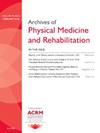比较高收入国家和中低收入国家卒中后上肢运动康复随机对照试验中使用的干预措施:中风康复干预和国家。
IF 3.6
2区 医学
Q1 REHABILITATION
Archives of physical medicine and rehabilitation
Pub Date : 2025-04-01
DOI:10.1016/j.apmr.2024.11.001
引用次数: 0
摘要
目的:在高收入国家(HICs)和中低收入国家(LMICs)进行的随机对照试验(RCTs)中,确定并比较中风后上肢(UE)运动恢复的干预措施:根据 PRISMA 指南,对截至 2021 年 4 月在五个数据库(CINAHL、Embase、PubMed、Scopus 和 Web of Science)中以英文发表的 RCT 进行了系统检索:包括交叉设计在内的RCT研究,只要是英文研究,且评估了针对确诊为脑卒中的成年人群(≥18岁)的脑卒中后UE运动康复干预,均可纳入:使用 Covidence 软件中的数据提取模板提取每项 RCT 的原产国和干预类型数据。研究筛选和数据提取由两名独立审稿人完成:共有 1,276 项 RCT 符合纳入标准,其中 978 项 RCT 在高收入国家/地区进行,298 项在低收入国家/地区进行。与低收入国家相比,在高收入国家进行的评估机器人技术和特定任务训练干预的研究明显更多:与高收入国家相比,低收入国家的脑卒中后康复治疗是在资源较少的环境下进行的。低收入国家和高收入国家在使用超早期运动康复干预措施方面存在一些差异,如机器人、特定任务训练、经颅磁刺激和针灸;但是,高收入国家和低收入国家在大多数干预措施方面没有显著差异。本文章由计算机程序翻译,如有差异,请以英文原文为准。
Comparing Interventions Used in Randomized Controlled Trials of Upper Extremity Motor Rehabilitation Post-stroke in High-Income Countries and Low-to-Middle-Income Countries
Objective
To identify and compare interventions for upper extremity (UE) motor recovery poststroke in randomized controlled trials (RCTs) conducted in high-income countries (HICs) and low-to-middle-income countries (LMICs).
Data Source
Systematic searches were conducted for RCTs published in English in 5 databases (CINAHL, Embase, PubMed, Scopus, and Web of Science) up to April 2021, in line with PRISMA guidelines.
Study Selection
RCTs, including crossover design, were included if they were in English and evaluated an intervention for poststroke UE motor rehabilitation, in an adult population (≥18y) diagnosed with stroke.
Data Extraction
Data on country of origin and type of intervention in each RCT were extracted using a data extraction template in Covidence software. Study screenings and data extraction were performed by 2 independent reviewers.
Data Synthesis
A total of 1276 RCTs met the inclusion criteria, with 978 RCTs conducted in HICs and 298 in LMICs. A significantly larger proportion of RCTs evaluating robotics and task-specific training interventions were conducted in HICs, compared to LMICs (P<.009). In contrast, a higher proportion of RCTs conducted in LMICs examined acupuncture (P<.001) and repetitive transcranial magnetic stimulation (rTMS) (P=.001) when compared to HICs.
Conclusions
Poststroke rehabilitation in LMICs is conducted in a lower resource environment when compared to HICs. Some differences exist in the use of UE motor rehabilitation interventions between LMICs and HICs such as robotics, task-specific training, rTMS, and acupuncture; however, there was no significant difference between HICs and LMICs for most interventions.
求助全文
通过发布文献求助,成功后即可免费获取论文全文。
去求助
来源期刊
CiteScore
6.20
自引率
4.70%
发文量
495
审稿时长
38 days
期刊介绍:
The Archives of Physical Medicine and Rehabilitation publishes original, peer-reviewed research and clinical reports on important trends and developments in physical medicine and rehabilitation and related fields. This international journal brings researchers and clinicians authoritative information on the therapeutic utilization of physical, behavioral and pharmaceutical agents in providing comprehensive care for individuals with chronic illness and disabilities.
Archives began publication in 1920, publishes monthly, and is the official journal of the American Congress of Rehabilitation Medicine. Its papers are cited more often than any other rehabilitation journal.

 求助内容:
求助内容: 应助结果提醒方式:
应助结果提醒方式:


